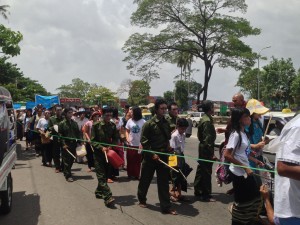Two Years On, Kachin People Push for Genuine and Just Peace
By Burma Partnership • June 11, 2013 On Sunday, 9 June, sixty Kachin community organizations and Burma campaign groups in 21 countries around the world took part in a Global Day of Action today to mark the 2nd anniversary of resumed fighting between the Burma Army and the Kachin Independence Army that broke a 17-year ceasefire. Read the statement by these groups here.
On Sunday, 9 June, sixty Kachin community organizations and Burma campaign groups in 21 countries around the world took part in a Global Day of Action today to mark the 2nd anniversary of resumed fighting between the Burma Army and the Kachin Independence Army that broke a 17-year ceasefire. Read the statement by these groups here.
Simultaneously in Rangoon, eighteen organizations came together and held a briefing that included the background and political and economic reasons for the conflict throughout the country and in Kachin State, as well as the current humanitarian crisis in camps for Internally Displaced Persons (IDPs). There was an emotional appeal from two IDP women to end the fighting and a sharing of the Burman perspective from our coordinator on the Buddhist Burman superiority complex that underlines ethnic conflict throughout the country. The briefing was attended by Rangoon-based diplomats, international non-governmental organizations and civil society organizations. See photos from the briefing here.
Groups also organized a march calling for peace, with protesters dressed as dead soldiers and civilians, and others carrying wreaths for those who have died. See photos of the march here. The marchers joined with an indoor event at Zaw Tanar Ya Ma Monastery, which was decorated with art installations and photos of IDPs and camps. There was also was an interfaith prayer ceremony led by Buddhist, Muslim, Christian and Hindu religious leaders, sharing of experiences from an IDP woman, a screening of the documentary film “Hopes Behind War”, a presentation of a collective statement, and musical performances. The statement called for the government to immediately initiate political dialogue leading towards true federalism and a genuine and just peace.
These events came in the context, not just of the 2nd anniversary since the renewal of conflict, but also the recent peace negotiations between the Kachin Independence Organization (KIO) and the Union Peace Working Committee that concluded on 30 May. A seven-point agreement was reached, with provisions for political dialogue to be held in the future, efforts to be made towards the cessation of hostilities, the establishment of a joint monitoring committee, the return of IDPs, discussion between the two militaries on positioning, the KIO to establish a team in the state capital, Myitkyina, and an agreement for future engagement with the same observers. The observers included the United Nationalities Federal Council (UNFC), UN Special Advisor to the Secretary General of the United Nations on Myanmar, Vijay Nambiar, representatives from Kachin civil society organizations, and a representative from the Chinese embassy, Lu Zhi.
Such peace talks were urgently needed. Over 100,000 people have been displaced over the past two years and humanitarian aid is simply not reaching them as the Burma government has not allowed aid to go towards those desperately in need. Consequently, among other tragedies, many young women and children are being trafficked into China. Outlined in a report released last Thursday by the Kachin Women’s Association of Thailand (KWAT), women on the border are particularly vulnerable to being drugged, tricked or forced into labor or marriages with Chinese men. Julia Marip of KWAT explained, “Push tens of thousands of people to China’s doorstep, deprive them of food and status, and you’ve created a perfect storm for human trafficking.”
Although cautiously welcomed by many, such an agreement is not the first to be signed between the government and a non-state armed group, and the Burma Army has a track record of consistently violating ceasefire agreements. Furthermore, and crucially for those suffering every day, an actual ceasefire was not agreed upon. It will take a long time before communities in Kachin State trust the integrity of the commitments made by the Burma government, particularly the point on political dialogue. Recent comments from the government about engaging in such political dialogue have still not led to actual action. This must include changing the deeply flawed 2008 Constitution that entrenches the root causes of the problem, the supreme control of the Burma Army over the country and the lack of ethnic rights and equality.
We urge the international community to welcome this most recent agreement as simply an initial step, and not to rush in and assume that this will logically pave the way for genuine peace. Until there is an actual political process, whereby deeply entrenched problems are addressed and a political settlement reached, the IDPs who want to go home will not be able to do so with the comfort and confidence that their future is safe. This time next year, we wish not to see the Kachin community and their supporters out on the streets again, marching for peace, but to celebrate the achievement of a genuine and just peace, not only in Kachin State but throughout Burma, and the return of refugees and IDPs to their homes with dignity. We therefore urge the Burma government, the UN, donor governments and agencies and other players who are supporting and are involved in the peace process to work towards this goal, and not take shortcuts that do not address the root causes of conflict in Burma.
Tags: Armed Conflict, Burma Partnership, Ethnic Nationalities, Kachin, ProtestThis post is in: Blog
Related PostsBurma Army Displays Blatant Disregard for 21st Century Panglong Peace Process
On Union Day, Reappraisal of the Peace Process is Needed
ရွမ္းျပည္တိုိးတက္ေရးပါတီ၊ ရွမ္းျပည္တပ္မေတာ္ SSPP/SSA ထုတ္ျပန္ေၾကညာခ်က္
Time for the Government to Accept the Reality of Human Rights Problems, Take Effective Measures and Move Forward
Kachin Region: War Torn Displaced Village Profiles









 All posts
All posts